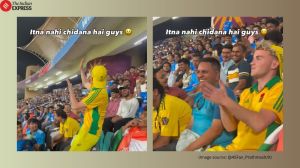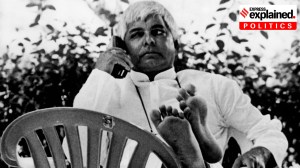US General to India: Make up your mind on missile policy
Washington’s impatience was evident this afternoon after the visiting Pentagon team suggested that India must first define its vision o...

Washington’s impatience was evident this afternoon after the visiting Pentagon team suggested that India must first define its vision on missile defence if there were to be any meaningful cooperation in the field.
‘‘India needs to make its internal decisions first. The Patriot system may or may not be part of that. Missile defence is an extremely complicated process,’’ Lt Gen Jeffrey B. Kohler, a senior officer at Defence Secretary Donald Rumsfeld’s office, said this afternoon at a briefing organised by the US Embassy here. Bilateral talks on missile defence began over two years ago under the NDA government. Specific discussions on the Patriot were started early this year.
South Block sources indicated Washington’s grouse was that the government had not proceeded with authoring a defined vision on missile defence for India, and even turned down the Pentagon’s offer in 2003 to help compile a missile defence doctrine based on NATO concepts.
Running parallel to Washington’s own pitch of the Patriot-3, Defence Minister Pranab Mukherjee recently went on record to say that New Delhi was ‘‘not interested’’ in purchasing the system, but wanted to cooperate on technology for India to be able to build its own missile shield. Kohler claimed that this view ‘‘did not come up’’ at the briefings held over the last two days.
While Kohler refused comment on the contents of the briefing, it is understood that the team made a specific mention of a crucial Patriot-3 test held just yesterday, in which the system successfully intercepted and destroyed a tactical ballistic missile capable of carrying a WMD warhead, at the White Sands Missile Range.
Kohler, on his third visit here in under 10 months, brought with him a team from the US Air Force, US Navy and contractors Lockheed-Martin and Boeing, which provided a ‘‘third level of detail’’ on the F-16 Falcon and F/A-18 Super Hornet fighters. The latter will vie for the IAF’s imminent tender for 124 aircraft.



- 01
- 02
- 03
- 04
- 05



























